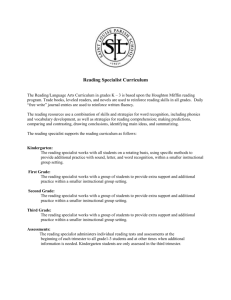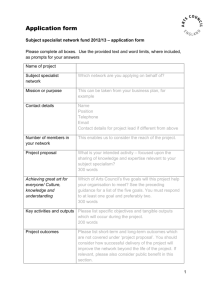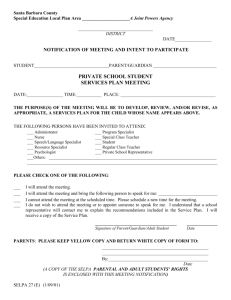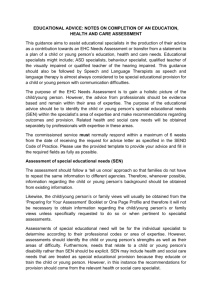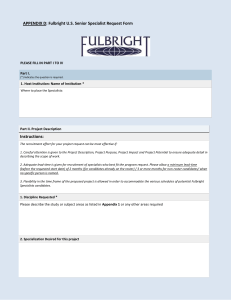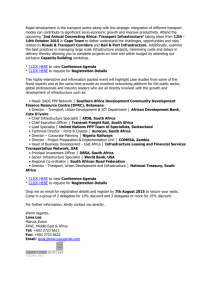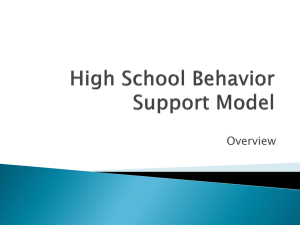Reading Specialists
advertisement
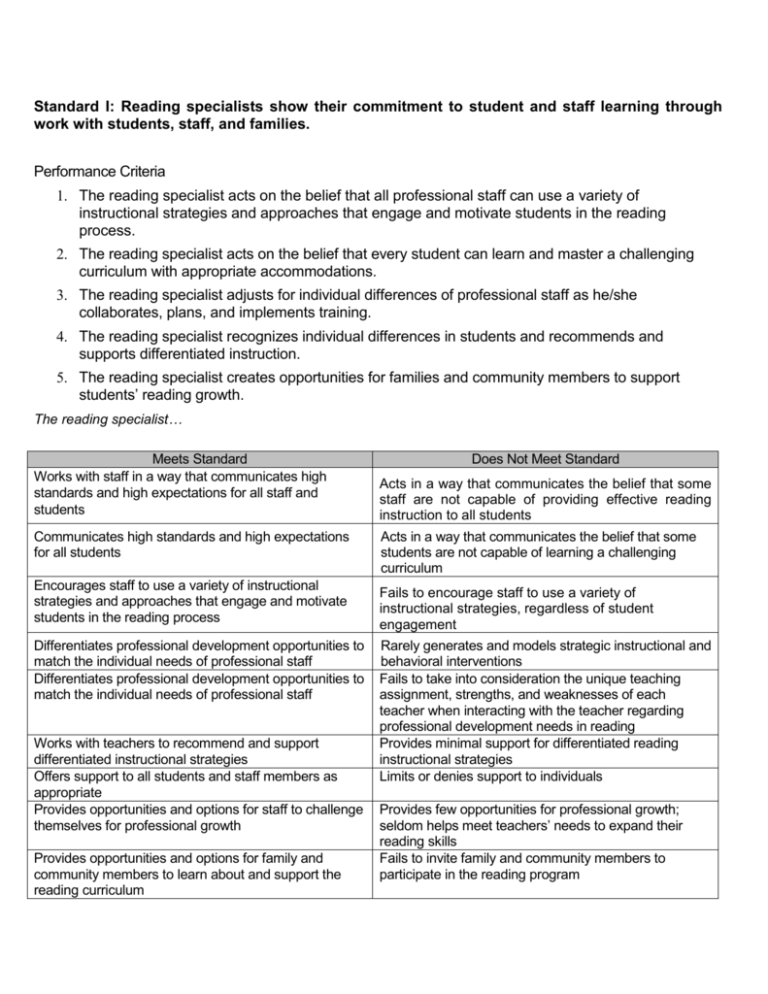
Standard I: Reading specialists show their commitment to student and staff learning through work with students, staff, and families. Performance Criteria 1. The reading specialist acts on the belief that all professional staff can use a variety of instructional strategies and approaches that engage and motivate students in the reading process. 2. The reading specialist acts on the belief that every student can learn and master a challenging curriculum with appropriate accommodations. 3. The reading specialist adjusts for individual differences of professional staff as he/she collaborates, plans, and implements training. 4. The reading specialist recognizes individual differences in students and recommends and supports differentiated instruction. 5. The reading specialist creates opportunities for families and community members to support students’ reading growth. The reading specialist… Meets Standard Works with staff in a way that communicates high standards and high expectations for all staff and students Communicates high standards and high expectations for all students Encourages staff to use a variety of instructional strategies and approaches that engage and motivate students in the reading process Differentiates professional development opportunities to match the individual needs of professional staff Differentiates professional development opportunities to match the individual needs of professional staff Works with teachers to recommend and support differentiated instructional strategies Offers support to all students and staff members as appropriate Provides opportunities and options for staff to challenge themselves for professional growth Provides opportunities and options for family and community members to learn about and support the reading curriculum Does Not Meet Standard Acts in a way that communicates the belief that some staff are not capable of providing effective reading instruction to all students Acts in a way that communicates the belief that some students are not capable of learning a challenging curriculum Fails to encourage staff to use a variety of instructional strategies, regardless of student engagement Rarely generates and models strategic instructional and behavioral interventions Fails to take into consideration the unique teaching assignment, strengths, and weaknesses of each teacher when interacting with the teacher regarding professional development needs in reading Provides minimal support for differentiated reading instructional strategies Limits or denies support to individuals Provides few opportunities for professional growth; seldom helps meet teachers’ needs to expand their reading skills Fails to invite family and community members to participate in the reading program Provides information to families on strategies that they can use to support their child’s growth in reading Provides little or no information to families on strategies that they can use to support their child’s growth in reading Standard II: Reading specialists are knowledgeable in their field and use their expertise to promote student and staff learning Performance Criteria 1. The reading specialist understands the reading curriculum and how it connects to system goals. 2. The reading specialist facilitates the implementation of reading curriculum, assessment, and instruction. 3. The reading specialist demonstrates comprehensive knowledge of the reading process. 4. The reading specialist disseminates current research and best practices to the professional staff. 5. The reading specialist offers staff multiple paths to knowledge. 6. The reading specialist supports staff in creating differentiated pathways to learning for students. 7. The reading specialist demonstrates knowledge of reading strategies and skills in working with students. The reading specialist… Meets Standard Demonstrates knowledge of the reading process Demonstrates knowledge of the MCPS reading curriculum and how it connects to Maryland standards Facilitates the instruction of reading across the content areas Does Not Meet Standard Fails to demonstrate knowledge of the reading process Fails to demonstrate knowledge of MCPS reading curriculum and how it connects to Maryland state standards Focuses support for reading instruction within a limited number of content areas Provides clear explanations of a variety of strategies for differentiation; supports staff as they develop and use strategies Provides minimal or confusing explanations of strategies for differentiation; limits support to presentation of strategies with little or no follow-up Disseminates current research and best practices in reading to professional staff Is not up to date on current research and best practices in reading; knows current research and best practices but does not share with staff Uses and teaches effective communication strategies (e.g., sets and follows agendas with clear outcomes, gathers input and acts on that input, uses active listening strategies) Communicates in a disorganized and/or unclear fashion; sets no agendas or outcomes for meetings and training Differentiates instruction as appropriate when working with students Delivers instruction in the same way to all students Plans and delivers instruction in a variety of reading Teaches a limited number of reading skills and skills and strategies and requires student use of those skills strategies; does not require independent student use of skills Plans and delivers instruction based on identified student needs Does not pre-assess to identify student needs; plans and delivers instruction regardless of student needs Standard III: Reading specialists are responsible for supporting a comprehensive reading program that promotes staff and student learning in the positive environment of a learning community. Performance Criteria 1. The reading specialist fosters a school-wide community that embraces an appreciation of reading. 2. The reading specialist fosters a professional climate that promotes openness, mutual respect, and collaboration in promoting student learning. 3. The reading specialist facilitates student learning in a variety of settings. 4. The reading specialist collaborates with staff to use resources to meet students’ individual reading needs. 5. The reading specialist organizes and manages resources essential to a comprehensive reading program. The reading specialist… Meets Standard Provides research-based reading strategies to promote staff members’ professional growth Models reading strategies for staff; invites staff to observe reading strategies being modeled Promotes school-wide reading incentive programs Maintains a reading resource library for staff use Coordinates the delivery of reading instruction in a variety of settings Seeks the support of colleagues and is open to applying advice or suggestions Collaborates with the staff development teacher(s) to support staff learning Uses reading specialist colleagues as critical friends to discuss ways to promote collegiality among staff members Shares with reading specialist colleagues ways in which instruction can be improved to enhance student learning: participates in planning and sharing with other reading specialists Seeks opportunities to enhance professional development through training sessions, conferences, professional organizations, etc; brings ideas back to school and models the use of these strategies in his/her own practice Does Not Meet Standard Fails to share reading strategies with staff Fails to model reading strategies for staff; avoids inviting staff to observe reading strategies being modeled Is not involved in school-wide reading programs Limits staff access to reading resources Delivers reading instruction in a limited number of settings Is not receptive or open to advice, suggestions, or support from colleagues Works independently from the staff development teacher Does not seek input or advice from reading specialist colleagues about establishing collegial relationships among staff members Fails to share information about ways in which instruction can be improved to enhance student learning; does not participate in planning and sharing with other reading specialists Rarely seeks opportunities to enhance professional development or bring ideas back to school; attends professional development but does not share information at school Standard IV: Reading specialists collaborate with administrators and staff to collect, analyze, and use reading data from formal and informal sources to improve reading achievement. Performance Criteria 1. The reading specialist provides assessment expertise to support quality instruction in order to improve student achievement. 2. The reading specialist provides professional development opportunities to help staff adapt instruction as indicated by the data. 3. The reading specialist administers both formal and informal reading assessments. 4. The reading specialist supports professional staff in the goal of promoting measurable growth in reading achievement using data from on-going assessment to inform instruction. The reading specialist… Meets Standard Supports staff in using assessment data appropriately to ensure that every student is progressing toward national, state, and MCPS standards Works with staff to provide support for students who have not passed standardized reading tests Assists staff in using multiple measures of student learning to plan and modify instruction Assists staff in developing and using rubrics / scoring tools to evaluate student work Assists staff in using a variety of formal and informal assessment formats Assists staff in making accommodations to assessments to meet the needs of students with differing learning styles or special needs Assists staff in using student performance data and other relevant information from prior grade or school to plan for appropriate instruction and/or placement Assists staff in using student achievement data to design instruction that supports academic growth and achievement for all students Designs support for staff based on school and student data Assesses students’ achievement and growth over time Works with teachers to recommend and support the use of differentiated instructional strategies Analyzes data and provides input to guidance counselors to select students for appropriate placement in reading classes and programs (MS) Does Not Meet Standard Does not refer to student data when working with staff; neglects to inform staff or standards, or inappropriately focuses on standardized test scores as the only measure of student progress Provides little or no support to staff to help students pass standardized reading tests Fails to assist staff in using multiple measures of student learning; assesses without subsequent modification of instruction Neglects to help staff develop and use rubrics / scoring tools Fails to advocate the use of a variety of assessment formats; emphasizes summative assessment Provides little in the way of resources or insight with respect to how best to provide assessment accommodations Plays little or no role in facilitating communication between teachers of different grades or disciplines for planning instruction or placement Trains staff to design instruction without reference to student achievement data; does not support staff use of data to plan instruction Plans support regardless of school and student data Provides little or no evaluation to check student achievement or growth Advocates the strategy of whole-group instruction over differentiation Has limited involvement in placement of students in special reading classes and programs (MS) Standard V: Reading specialists are committed to their own continuous improvement and professional development. Performance Criteria 1. The reading specialist continually reflects and appraises the effectiveness of his/her practice in working with professional staff to promote reading achievement. 2. The reading specialist continually reflects upon his/her practice in promoting student learning and adjusts instruction accordingly. 3. The reading specialist accesses professional resources and reading research and consults with colleagues to promote their own professional growth. 4. The reading specialist is an active member of professional learning communities. The reading specialistt… Meets Standard Analyzes the success of efforts taken during the professional growth year of the cycle; initiates reflective conversations with PDP support team, other peers, staff development teachers, or supervisory staff Develops and maintains a portfolio or other means of assembling evidence of meeting evaluation standards Keeps up to date on current educational research and successful research-based practices as they relate to reading Seeks opportunities to enhance professional development through training sessions, information from specialists, conferences, professional organizations, etc; brings ideas back to school and models use of these in his/her own practice Solicits and uses feedback from staff and school administrators; reflects on feedback and makes appropriate modifications to practices Creates a professional development plan (PDP); implements strategies that support PDP courses Examines student work with colleagues to analyze and adjust instruction Engages in peer visits with reflection Reflects on own strengths and weaknesses in working with students and modifies instruction accordingly Reflects on own strengths and weaknesses and modifies professional activities accordingly Does Not Meet Standard Does not use the evaluation year to analyze the success of efforts undertaken during professional growth years of the cycle; does not initiate reflective conversations with PDP support team, other peers, staff development teachers, or supervisory staff Assembles little or no evidence of meeting evaluation standard Does not explore current educational research and successful research-based practices as they relate to reading Rarely seeks opportunities to enhance professional development to bring ideas back to school Does not solicit feedback or make appropriate modifications to practices based on feedback Does not develop a PDP; does not implement strategies that support PDP outcomes Does not work with colleagues to analyze student work Completes a full multi-year evaluation cycle without engaging in peer visits with reflection Delivers instruction without reflection on own strengths and weaknesses Does not reflect on the effectiveness of his/her support to professional colleagues Standard VI: Reading specialists exhibit a high degree of professionalism Performance Criteria 1. The reading specialist understands and supports the vision of the school system. 2. The reading specialist demonstrates leadership in the educational community. 3. The reading specialist works collaboratively with all members of the school community. 4. The reading specialist contributes to the smooth functioning of the school environment. The reading specialist… Meets Standard Implements MCPS reading curriculum Evaluates the alignment of the school’s reding program with system-wide standards Uses practices and procedures that align with MCPS vision, goals, policies, and regulations Participates in system-based representative structures such as district-wide work groups and professional organizations Participates in and/or takes a leadership role in professional development activities, committees, or school-level decision making (e.g., leadership team, grade-level/department meeting.) Informs school leadership team of reading initiatives and priorities Responds clearly to professional staff inquires concerning reading curriculum and reading strategies Works effectively with other professionals to support teachers in reading (staff development teacher(s), consulting teachers, mentors, specialists, resource teachers, administrators) Works to promote vertical articulation Solicits input from colleagues and works with school leadership to create and implement the school improvement plan (SIP) regarding reading Represents the school professionally when dealing with students, parents, and other members of the community Serves as a formal or informal mentor to other professional staff on content area reading Does Not Meet Standard Does not implement MCPS reading curriculum Maintains the status quo of the school reading program despite changes in system-wide standards Uses practices and procedures that are inconsistent with MCPS vision, goals, policies, and regulations Does not use appropriate avenues for expressing professional concerns Does not participate in required professional development or leadership activities within the school; contributes little to school-level decision making Fails to inform school leadership team of MCPS reading initiatives and priorities Avoids communication with staff about reading issues Plans support to teachers regardless of the priorities and activities of other professionals Works in isolation regardless of cluster reading initiatives Creates the leadership plan in isolation, or with contributions only from leadership team members, does not contribute to the reading goals in the SIP Does not represent the school professionally when dealing with students, parents, and other members of the community Does not reach out to support other professional staff on content area reading Meets Standard Meets professional obligations in a timely fashion (e.g., submits paperwork, reports, analyze data, and responses to requests for information on time) Attends work regularly, arrives at work on times, and does not leave before the end of the defined work day Monitors student behavior and reinforces appropriate behavior Demonstrates commitment to MCPS initiatives for staff development by providing appropriate training opportunities aimed at improving student achievement Does Not Meet Standard Does not meet professional obligations in a timely fashion; does not submit paperwork Is frequently absent, arrives at work late, and/or leaves before the end of the defined work day Ignores inappropriate student behavior Plans and delivers training opportunities for professional staff which consistently disregard MCPS initiatives in reading


